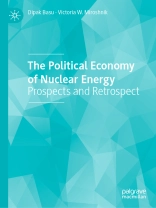Using primarily Russian sources, this book explains the political and economic aspects of nuclear power. The nuclear fuel cycle is described, from the mining of natural uranium to the ultimate power generation, and to reprocessing to produce plutonium which is essential for both electricity generation and for weapons production. Historical aspects of nuclear developments in Germany, the USA, India, China and the Soviet Union are also considered and explained. The book then proceeds to argue that Russia is more powerful today in its nuclear weapons system and delivery than ever before, and that it is precisely this which has provoked President Trump to cancel the strategic nuclear weapons reduction treaty.
İçerik tablosu
Part I: Political Economy of Nuclear Power.- 1. Advantages of Nuclear Power.- 2. Geopolitical aspects of Nuclear Power.- 3. Economic Aspects of Nuclear Power.- 4. Military Aspects of Nuclear Energy.- Part II: Retrospect of Nuclear Power Development.- 5. History of Nuclear Power Development.- 6. Global Nuclear Policy Development.- 7. Global Nuclear Investment Environment.- Part III: Prospect of Nuclear Power Development.- 8. Germany as a Nuclear Power.- 9. The USA as a Nuclear Power.- 10. Russia as a Nuclear Power.- 11. Japan as a Nuclear Power.- 12. India as a Nuclear Power.- 13. China as a Nuclear Power.- 14. The Future of Nuclear Power Development.
Yazar hakkında
Dipak Basu is Emeritus Professor in Economics at Nagasaki University, Japan. He was previously a Research Officer in the Department of Applied Economics at the University of Cambridge, and a Lecturer in Econometrics at the Institute of Agricultural Economics, University of Oxford, UK.
Victoria W. Miroshnik is Professor in Management at Reitaku University in Tokyo, Japan. She has a Ph D from the University of Glasgow and was previously a professor at OP Jindal University, in New Delhi, India. She has published 15 books and approximately 25 articles in major journals.












